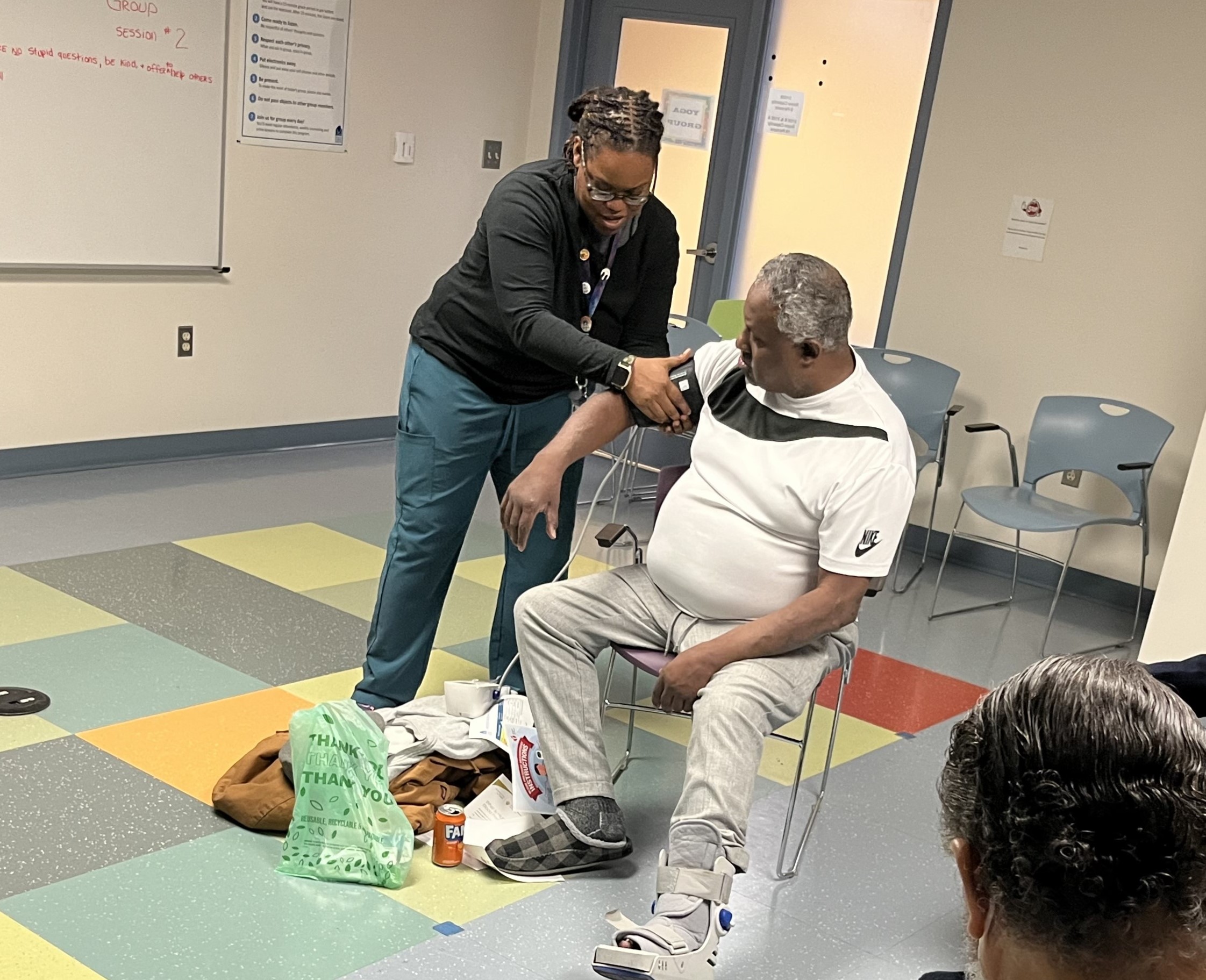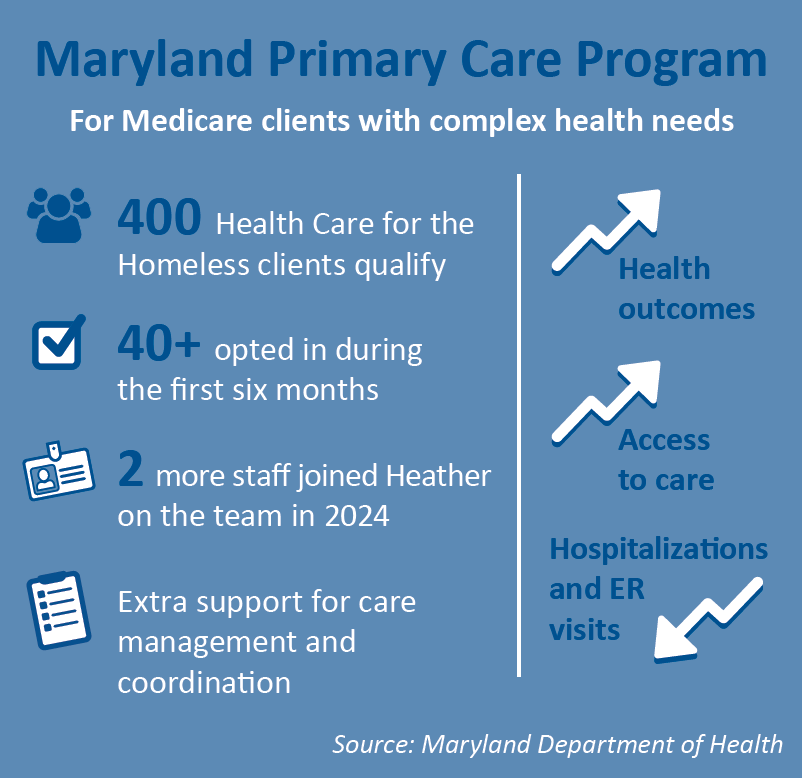Have you ever felt like throwing up your hands in frustration? Sometimes it can feel like “nothing” is working or “everything” is against you. Each of us has strengths. Even if the odds are truly against us, there are actions we can take.
Due to freezing temperatures, the Mayor’s Office of Homeless Services has declared a winter shelter warning for Thursday, December 19, 2024 through Tuesday, December 24 at 9 am. Call 211 (available 24/7) or 443-984-9540 to connect with shelter. Get more info here.


02.14.24
Last year, we joined the Maryland Primary Care Program (MDPCP) and hired Senior Nurse Care Coordinator Heather Douglas to help improve access for Medicare clients with pressing health needs. In this edition of our "Day in the Life" series, let's see how she spends her days.
8:00 am. Heather Douglas, RN, LCSW-C, arrives at our Fallsway clinic and settles in at her desk to check voicemails and online databases. Last night three clients were discharged from hospitals in Baltimore, and another six visited emergency rooms. She takes note of who to call later. “For in-patient discharges, I make contact within 48 hours; for ERs, within a week.”
The first on a growing team, Heather's role is new and unique: she gives clients with particularly complex health needs more hands-on support to get care and navigate the health care system.
9:00 am. Heather's first client arrives. She has around 40 clients on her caseload who have opted into MDPCP. Mr. H was recently intubated while hospitalized and then discharged to a city shelter.
Each week, Mr. H comes to the clinic for help taking his medications correctly. As Heather fills his pill box, she says, “You're on 12 medications—that’s a lot for anyone to keep track of.”
Above: Heather takes Mr. H's vitals, height/weight, blood pressure, and A1C. He is concerned about recently gaining weight.
"There are all these heavy holiday meals at the shelter right now,” he says. “So I’m eating a lot.”
"It's hard!" she tells Mr. H. "Nobody's perfect."
Over an hour-long appointment, Heather and Mr. H discuss his blood pressure, medications, tobacco use (he wants to smoke less, but he isn’t interested in a nicotine patch) as well as diabetes; she examines his feet and refers him to a podiatrist. If he's interested, Heather can even accompany him to see the specialist. What would have taken Mr. H a series of nursing appointments before MDPCP, Heather completes in one session.
10:30 am. In the clinic group rooms, Heather sets up for the second meeting of her new “Blood Pressure EducationGroup.” She reintroduces herself to everyone—some members are clients that Heather sees individually. Most are older Black and Latino men, though she has female attendees. “Black women in particular, we’ve seen, have difficulty addressing their high blood pressure; part of what we’re doing here is trying to address those disparities.”
Heather goes over group norms, which are written up on the whiteboard. One member adds, “We should share what we learn here, if it can help somebody else.”
“Absolutely,” says Heather. “Health information is wealth.”
They build off what they talked about last week. “What does blood pressure mean in your life?” she asks the room. “What causes high blood pressure?”
Members call out: being overweight. Smoking. Diet. Stress. “Looking at your BGE bill!”
They discuss stressors in their lives. Lack of housing and worry about money are big factors. “Crime. Being safe.” Some have been mugged or seen violence on the street. Many agree that, after senior centers and community resources shut down during the pandemic, isolation has played a big part, too.
“If you have COPD, diabetes, anxiety, depression—if you’re worried about your safety, if you’re waiting hours for transportation,” Heather explains, “All of those things can affect your heart.”

Above: Heather helps everyone check their own blood pressure. One member’s is high enough to be in the red “danger zone” on one of the handouts; he realizes he didn’t take his medicine that morning.
Next, Heather hands out new electronic blood pressure cuffs, still in their boxes, as well as printed log sheets to record their readings. One man declines, as his eyesight is too poor to read the numbers well or write them down. “I get my pressure taken every week here at the clinic, anyway.”
“Everybody in this room has been doing things to help get their numbers down,” says Heather. “And you should be proud of that!”
11:30 am. Heather helps group attendees get where they need to go next, checking bus schedules and ordering rideshares. “I order Ubers for clients every day,” she says, “or sometimes I accompany them to appointments.
“I love being in the room when clients see a specialist. Many don’t have anyone to go with them, and some people are too nervous to ask doctors questions. I try to model that you have control over your own care. You’re the expert in your own health.”
12:30 pm. After lunch, Heather focuses on follow-up calls. She downloads reports from discharges and puts them in clients’ charts for doctors and nurses on the team. One client has been admitted to a
long-term nursing facility; she calls to see if they are going to take over her primary care.
2:00 pm. Looking over her list of MDPCP-eligible clients, Heather sees that three are currently at the clinic for appointments. After getting the green light from a client's care team nurse, Heather drops by an exam room to talk about the program.
Her pitch: “It's free, and you get another pair of hands to support your health care needs.”
This client is interested, especially to see how Heather can help him connect with a dermatologist and podiatrist, and asks if she can help him rectify an unexpected medical bill.
“Absolutely,” she says. “I'm here to advocate for you.”
The client already gets primary care here, so his regular RN and Heather will be teaming up on his care. They set a date to discuss his health care needs and develop a care plan at his next nursing appointment in one week.
4:00 pm. Heather ends her day preparing reminders for tomorrow. She makes a note to herself, for next week’s Blood Pressure Group meeting, to bring her stethoscope—she promised a few attendees they would get to hear their own heartbeats.
“That’s one of my favorite exercises to do,” she says. “Many of the clients I see are going through so much—you can get disconnected from your own body.
“I’ll hear them say, ‘I’ve never heard my heart before!’ and see a lightbulb go off: ‘Wow, there’s something in my body that’s keeping me alive.’ Your body is working with you and not against you. That’s a powerful thing.”

Read another installment in the "Day in the life" series:
More Recent News
Send one email today to advocate for housing that serves all Marylanders. Let Governor Moore know that more permanent supportive housing is a good thing—and urge him to stay the course.
At our annual staff holiday party, we take time to honor and celebrate staff members who best represent our Core Values and one HCH-er at Heart.
Larrice is a mother, grandmother, teacher, cook and storyteller who was recently featured in our original documentary, “Taking Care: Portraits from Baltimore.”


